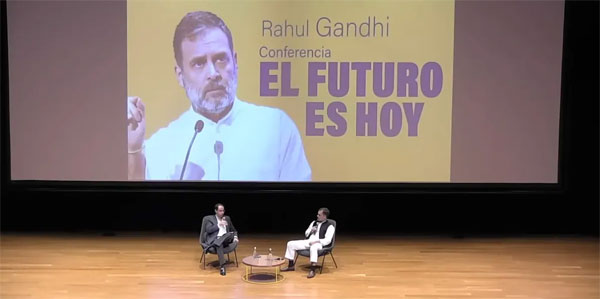Daijiworld Media Network - Bogota
Bogota, Oct 2: Congress leader Rahul Gandhi, speaking at Colombia’s EIA University, launched a pointed critique of the Narendra Modi government, warning that India’s democracy is facing a systematic and dangerous erosion. Addressing a full house of students and faculty in Envigado, Gandhi described the weakening of democratic structures as the most serious challenge confronting India today.
He emphasised that India’s core strength lies in its vast diversity—of languages, religions, and traditions—and argued that only a democratic system can provide space for all these identities to coexist and thrive. “India is a conversation between all its people,” he said, noting that this open dialogue is what makes the country truly resilient.

In contrast to China’s centralised and rigid governance model, Gandhi described India as inherently decentralised and pluralistic. He asserted that any push toward authoritarianism in India is bound to collapse under the weight of its own incompatibility with the nation's design.
Turning his focus to the global stage, Gandhi explored India’s role in the rapidly evolving energy economy. He traced the historical shifts in global power through technological revolutions—from Britain’s command over coal and steam to America’s leadership in oil and internal combustion. He said the next chapter will be defined by electric mobility and battery innovation, with China currently in the lead. India, he argued, is uniquely positioned between the two giants and must decide how it will participate in this emerging contest.
Despite optimism about India's strategic position, Gandhi expressed concern about domestic vulnerabilities. He underscored the importance of preserving regional languages and cultures, cautioning that any effort to marginalise them would weaken national unity. He also addressed rising unemployment, pointing out the limitations of India’s service-driven economy in creating widespread job opportunities.
Drawing a comparison with the U.S., Gandhi noted how Donald Trump’s rise was fuelled by discontent among those left behind by the loss of industrial jobs—a warning sign, he implied, for India’s own economic trajectory.
He concluded by urging India to forge a new path—developing a democratic model of production that can rival China’s efficiency without sacrificing civil liberties or cultural diversity. Only through inclusive governance and innovation, he said, can India navigate both its internal challenges and its place in the global power shift.